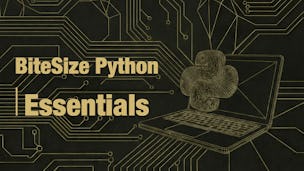Ce cours propose une exploration approfondie des quatre structures de données intégrées à Python : les listes, les tuples, les ensembles et les dictionnaires. Chaque structure sera présentée en détail, en se concentrant sur la façon de les créer, d'y accéder et de les manipuler efficacement. Le cours mettra l'accent sur leurs caractéristiques uniques et les cas d'utilisation appropriés. Les apprenants appliqueront également leur compréhension dans une étude de cas, montrant l'application pratique de ces structures de données pour résoudre des problèmes du monde réel.

Python pour les débutants absolus : Structure des données

Python pour les débutants absolus : Structure des données
Ce cours fait partie de Spécialisation BiteSize Python pour les débutants absolus

Instructeur : Di Wu
Inclus avec
Ce que vous apprendrez
Évaluer les forces et les faiblesses des différentes structures de données Python et les appliquer pour résoudre des problèmes pratiques
Mettre en œuvre diverses opérations sur les structures de données Python, telles que l'accès, le découpage, la modification et l'utilisation de compréhensions
Comprendre les caractéristiques et l'utilisation des principales structures de données de Python, notamment les listes, les tuples, les ensembles et les dictionnaires.
Compétences que vous acquerrez
- Catégorie : Manipulation de données
- Catégorie : Accès aux données
- Catégorie : Dictionnaire de données
- Catégorie : Traitement des données
- Catégorie : Programmation en Python
- Catégorie : structures de données
Détails à connaître

Ajouter à votre profil LinkedIn
4 devoirs
Découvrez comment les employés des entreprises prestigieuses maîtrisent des compétences recherchées

Élaborez votre expertise du sujet
- Apprenez de nouveaux concepts auprès d'experts du secteur
- Acquérez une compréhension de base d'un sujet ou d'un outil
- Développez des compétences professionnelles avec des projets pratiques
- Obtenez un certificat professionnel partageable

Il y a 5 modules dans ce cours
Ce module présente la liste en tant que structure de données intégrée à Python. Il couvre les bases de ce qu'est une liste, comment créer des listes, y compris des listes hétérogènes (listes contenant différents types de données), et comment y accéder, les découper et les manipuler. En outre, les apprenants exploreront la compréhension de liste, un moyen puissant de Python pour travailler efficacement avec les listes.
Inclus
5 lectures1 devoir10 laboratoires non notés
Ce module explore le tuple, une structure de données intégrée à Python. Il explique ce qu'est un tuple, comment en créer un et comment travailler avec des tuples hétérogènes (contenant des éléments de types différents). Les apprenants apprendront à accéder aux éléments par index et par itération, à découper les tuples et à comprendre le concept de compréhension des tuple pour une manipulation efficace des données.
Inclus
2 lectures1 devoir6 laboratoires non notés
Ce module présente l'Ensemble, une structure de données intégrée à Python qui stocke des éléments uniques et non ordonnés. Il explique ce qu'est un ensemble, comment en créer un et comment gérer les éléments d'un ensemble. Le module explore également les opérations sur les ensembles (telles que l'union, l'intersection et la différence), les méthodes courantes sur les ensembles et la compréhension des ensembles pour une manipulation efficace des données.
Inclus
2 lectures1 devoir5 laboratoires non notés
Ce module se concentre sur le dictionnaire (dict), une structure de données intégrée à Python qui stocke des paires clé-valeur. Il explique ce qu'est un dictionnaire, comment en créer un et comment accéder à ses éléments à l'aide de clés. Les apprenants exploreront les méthodes courantes du dictionnaire pour manipuler les données, et le module se termine par une introduction à la compréhension du dictionnaire pour une création et un traitement efficaces des données.
Inclus
2 lectures1 devoir4 laboratoires non notés
Dans ce module, les étudiants appliqueront leurs connaissances des structures de données intégrées à Python - liste, tuple, ensemble et dictionnaire - en travaillant sur une étude de cas réelle impliquant un carnet de notes pour les étudiants. Ils utiliseront chacune des structures de données pour stocker et manipuler les données relatives aux notes, ce qui leur permettra de mettre en pratique et d'améliorer leur compréhension tout en comparant les avantages et les limites de chaque structure.
Inclus
4 laboratoires non notés
Obtenez un certificat professionnel
Ajoutez ce titre à votre profil LinkedIn, à votre curriculum vitae ou à votre CV. Partagez-le sur les médias sociaux et dans votre évaluation des performances.
Instructeur

Offert par
En savoir plus sur Analyse des Données

University of Colorado Boulder

University of Colorado Boulder
Pour quelles raisons les étudiants sur Coursera nous choisissent-ils pour leur carrière ?

Felipe M.

Jennifer J.

Larry W.

Chaitanya A.

Ouvrez de nouvelles portes avec Coursera Plus
Accès illimité à 10,000+ cours de niveau international, projets pratiques et programmes de certification prêts à l'emploi - tous inclus dans votre abonnement.
Faites progresser votre carrière avec un diplôme en ligne
Obtenez un diplôme auprès d’universités de renommée mondiale - 100 % en ligne
Rejoignez plus de 3 400 entreprises mondiales qui ont choisi Coursera pour les affaires
Améliorez les compétences de vos employés pour exceller dans l’économie numérique
Foire Aux Questions
Pour accéder aux supports de cours, aux devoirs et pour obtenir un certificat, vous devez acheter l'expérience de certificat lorsque vous vous inscrivez à un cours. Vous pouvez essayer un essai gratuit ou demander une aide financière. Le cours peut proposer l'option "Cours complet, pas de certificat". Cette option vous permet de consulter tous les supports de cours, de soumettre les évaluations requises et d'obtenir une note finale. Cela signifie également que vous ne pourrez pas acheter un certificat d'expérience.
Lorsque vous vous inscrivez au cours, vous avez accès à tous les cours de la spécialisation et vous obtenez un certificat lorsque vous terminez le travail. Votre certificat électronique sera ajouté à votre page Réalisations - de là, vous pouvez imprimer votre certificat ou l'ajouter à votre profil LinkedIn.
Oui, pour certains programmes de formation, vous pouvez demander une aide financière ou une bourse si vous n'avez pas les moyens de payer les frais d'inscription. Si une aide financière ou une bourse est disponible pour votre programme de formation, vous trouverez un lien de demande sur la page de description.
Plus de questions
Aide financière disponible,

